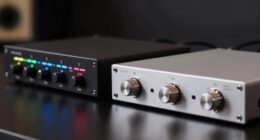To set up a successful music school, you'll need to cover several key bases. First, develop a detailed business plan outlining financial projections, marketing strategies, and operational details. Guarantee legal compliance by obtaining necessary licenses, permits, and registrations, including music licenses for copyrighted material. Next, find a suitable location that's accessible, visible, and soundproofed. Build a team of highly qualified teachers and provide ongoing professional development opportunities. Create a strong online presence through a professional website and social media engagement. Finally, establish efficient day-to-day operations, including scheduling, communication, and equipment maintenance. By following these steps, you'll be well on your way to creating a thriving music school – and there's more to learn ahead. Additionally, fostering a welcoming and inclusive community for students and staff will play a significant role in the school’s success. Understanding how to start a music school also involves adapting to changing trends in music education, such as incorporating technology and offering virtual lessons. By staying innovative and student-focused, you can ensure your music school stands out in a competitive industry.
Key Takeaways
- Establish a comprehensive business plan with financial projections, marketing strategies, and operational details to set a strong foundation.
- Secure necessary licenses, permits, and registrations to ensure legal compliance and avoid potential penalties.
- Choose a suitable location with soundproofing, visibility, and ample parking to create an ideal learning environment.
- Hire highly qualified teachers with diverse expertise and provide ongoing professional development opportunities to maintain excellence.
- Develop a strong online presence through a professional website, social media, and SEO strategies to attract students and grow the business.
Developing a Business Plan
As you start establishing a music school, creating a thorough business plan is the essential first step in transforming your vision into a successful and sustainable enterprise. This plan serves as a roadmap, outlining your goals, target audience, and competitive analysis. It's important to include financial projections, marketing strategies, and operational details to ensure a thorough understanding of your school's needs.
In your business plan, outline the structure of your school, staff responsibilities, and curriculum development. This will help you identify areas that require attention and allocate resources effectively. Financial information, such as startup costs, revenue projections, and budget allocation, is also crucial.
A well-developed business plan will help you secure funding, attract investors, and guide the growth of your music school. By including these essential elements, you'll be well-equipped to navigate the challenges of starting a music school and set yourself up for long-term success.
Ensuring Legal Compliance

When establishing your music school, it's crucial to make sure you're operating legally.
You'll need to obtain necessary licenses and permits, register your business name, and comply with tax regulations to avoid any legal issues.
Obtain Necessary Licenses
You'll need to obtain several licenses and permits to make sure your music school operates legally and avoids costly fines or penalties. Meeting legal requirements is essential, and it starts with acquiring a business license. This license allows you to operate your music school legally, and its requirements vary depending on your location.
Additionally, you'll need a Certificate of Occupancy, which guarantees your teaching space meets safety standards and is legally habitable.
When it comes to music licenses, you'll need to secure permits from organizations like ASCAP, BMI, and SESAC if you plan to use copyrighted music in your curriculum. These licenses give you permission to play or perform copyrighted music, and failing to obtain them can result in legal action.
Register Business Name
With your licenses and permits in order, it's time to give your music school an official identity by registering a unique and memorable business name that reflects your school's identity and offerings. This important step ensures legal compliance and sets your school apart from others. Conduct a thorough search to confirm the chosen name is not already in use by another business.
| Step | Action |
|---|---|
| 1 | Choose a unique and memorable business name |
| 2 | Register the business name with the appropriate state or local government authorities |
| 3 | Obtain a DBA (Doing Business As) certificate if operating under a name different from the owner's legal name |
Tax Compliance Essentials
Set up your music school for long-term success by obtaining an Employer Identification Number (EIN) from the IRS, an essential step in ensuring tax compliance and separating your personal and business finances.
This unique identifier is required for tax purposes, and you'll need it to open a business bank account, file taxes, and hire employees. Make sure compliance with federal, state, and county regulations regarding tax laws to avoid any legal issues.
If you plan to use licensed music in your school, acquire necessary licenses from organizations like ASCAP, BMI, and SESAC. Registering your business as an LLC or C Corp will establish a legal entity for tax compliance, providing liability protection and tax benefits.
Having a clear understanding of your tax obligations and requirements is vital to operate your music school legally. By following these tax compliance essentials, you'll be well on your way to establishing a successful and legally sound music school.
Finding the Right Location

How important is the facility size of your music school from the perspective of your target audience – students and their parents? When selecting the right location for your music school, take into account the ease of access for your students and their parents. Ideally, you want to be near schools or residential areas to make it convenient for them to attend classes.
The facility size is also vital, as it will determine the number of classrooms you can have and your potential for expansion in the future.
Another essential factor to take into account is soundproofing. You want to make sure that your facility is soundproofed to minimize distractions and provide a conducive learning environment for your students.
Additionally, assess the visibility of your location for marketing purposes and attracting new students. A location with high visibility can help increase foot traffic and attract more students to your school.
Lastly, don't forget to factor in parking options. Ample parking spaces can accommodate your students and staff, making it easier for them to attend classes and work.
Building Your Team

As you establish your music school, assembling a team of highly qualified teachers who share your passion for music education is essential to delivering exceptional instruction and fostering a supportive learning environment.
To build a successful music school, you need to focus on hiring the right teaching staff. Here are some key considerations:
| Criterion | Description | Importance |
|---|---|---|
| Qualifications | Music education degrees and experience in music instruction | High |
| Diversity | Expertise in various musical genres and instruments | Medium |
| Training | Ongoing professional development opportunities | High |
Marketing Your School

Now that you've built your team, it's time to focus on marketing your music school to attract students.
To do this effectively, you'll need to define your target audience, build a strong online presence, and develop promotional materials that showcase your school's unique offerings.
Define Target Audience
When defining your target audience, pinpoint the specific age groups, skill levels, and musical interests that align with your school's unique strengths and resources. Identify whether you'll cater to children, teens, or adults, and determine the skill levels you'll accommodate, from beginners to advanced musicians. Consider the musical genres or instruments you specialize in, as this will attract students with similar interests.
You should also determine the geographical area or community where your music school will be located, targeting local students who'll be more likely to enroll. Research the preferences and needs of your target audience to tailor your marketing strategies effectively. Understand what motivates them to learn music, what their goals are, and what they expect from your school.
Build Online Presence
You'll need a solid online presence to effectively market your music school and attract potential students, starting with a professional website that showcases your programs, faculty, and student achievements. This will be the central hub of your online presence, providing a thorough overview of your music school's unique offerings.
Beyond your website, leverage social media platforms like Facebook, Instagram, and YouTube to engage with potential students and families, share updates, and provide a glimpse into your school's community.
To increase your online visibility, implement search engine optimization (SEO) strategies to attract organic traffic to your website. Additionally, utilize targeted online advertising through platforms like Google Ads and Facebook Ads to reach a broader audience.
Create compelling content, such as blog posts, videos, and testimonials, to highlight the benefits and achievements of your music school. By establishing a strong online presence, you'll be able to effectively market your school and attract students who are the right fit for your programs.
Develop Promotional Materials
Developing effective promotional materials is essential to marketing your music school, as they provide a thorough representation of your brand and programs that can be shared with potential students and their families. These materials should showcase your school's unique offerings and benefits, highlighting what sets you apart from other music schools.
To create visually engaging promotional materials, consider the following strategies:
| Material | Tips |
|---|---|
| Brochures | Highlight student success stories, include photos of your facilities and instructors |
| Flyers | Use eye-catching designs, emphasize special promotions or discounts |
| Posters | Display in local music stores, schools, or community centers |
| Social Media Ads | Target specific demographics, interests, and behaviors |
| Email Campaigns | Share updates, news, and promotions with subscribers |
In addition to these materials, consider leveraging digital marketing tools, such as social media ads and email campaigns, to reach a wider audience. You can also collaborate with local businesses, schools, and community organizations to promote your music school through partnerships and events. By developing a thorough promotional strategy, you'll be well on your way to attracting new students and growing your music school.
Managing Day-to-Day Operations

To keep your music school running smoothly, set up a system to manage day-to-day operations, starting with a detailed schedule that outlines classes, rehearsals, and performances. This will help you streamline daily operations, guaranteeing that everything runs like clockwork.
When you're starting a music school, it's crucial to prioritize efficient communication channels, such as email and messaging apps, to coordinate with staff, students, and parents. This will help you stay on top of music lessons, Teaching Music, and other small business tasks.
Establish clear policies and procedures for student enrollment, tuition payments, and attendance tracking to avoid any confusion or miscommunication. Regularly assess equipment maintenance needs and schedule repairs or replacements to ensure smooth operations.
Frequently Asked Questions
How to Establish a Music School?
To establish a music school, you'll need to research local demand, obtain necessary permits, develop a curriculum, hire qualified instructors, and invest in quality instruments and technology to create an ideal learning environment.
How Much Do Music School Owners Make?
As you harmonize your entrepreneurial dreams with a passion for music, you'll strike a lucrative chord: music school owners can hit the high notes with salaries ranging from $55,000 to $80,000 per year.
How to Manage Music Academy?
To manage your music academy effectively, hire passionate instructors, provide ongoing training, establish clear communication channels, evaluate performance regularly, and foster a positive work environment to boost staff morale and retention.
How to Start Music Classes?
To start music classes, define your target audience, develop a structured curriculum, and hire passionate instructors. Then, create a welcoming environment, and use effective marketing to attract students, offering flexible scheduling options.
Conclusion
You've made it! As the saying goes, 'Rome wasn't built in a day,' and neither will your music school be. But with a solid business plan, legal compliance, a great location, a talented team, effective marketing, and smooth day-to-day operations, you'll be well on your way to creating a thriving music school.
Remember, consistency and persistence are key – stay focused, and your school will flourish.










